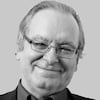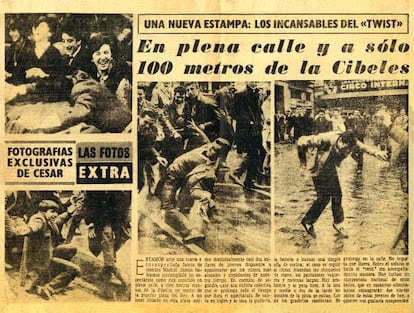Twisting at the Price
A new CD boxed set relives the dawn of rock'n'roll in Spain


On November 18, 1962, the Circo Price winter circus and music hall in Madrid announced an addition to its program: a matinee session dedicated to "modern music." The Spanish capital had already seen similar events, which had been held in student halls of residence, but what the Price was proposing was a giant leap forward: it was open to the public, in the center of the city, and seated 2,200 people. The initiative was a hit, but also aroused the ire of the Franco regime. Barely a year later, in early 1964, the authorities banned the concerts.
A new three-CD boxed set entitled La leyenda del Price (or, The legend of the Price) with a lavishly illustrated 44-page booklet, tells the story of those heady days. José Ramón Pardo, who compiled the collection, admits that there are few outstanding artists therein.
"The record companies signed up anybody who was halfway decent," he explains. "But they had to sing Spanish language versions of foreign hits, and they didn't allow them to do their own thing. And the production tended to be pretty minimal."
That said, for those with an interest in the roots of Spanish rock, there are a few gems. Among the first groups to play at the Price - which was demolished in the early 1970s; the Culture Ministry now sits on the site, just behind Gran Vía - were Los Cinco Estudiantes, forerunners to Los Brincos, along with Los Tonys, featuring Micky and Fernando Argenta, the Pekenikes, and the Relámpagos, the latter being where songwriting duo Herrero y Armenteros started out. Later on they would be joined by Los Diamond Boys, the Gibralatar-based group where Albert Hammond, of It Never Rains in Southern California fame and father of a member of The Strokes, got his start.
What the Price's shows - which often featured interviews with minor celebrities between the acts - lacked in technical proficiency, they more than made up for with enthusiasm, according to Pardo.

"The equipment the bands used was often home-made: guitars, amplifiers... everything. Although some kids, from wealthier families, like my uncle, Juan Pardo, whose father was a military attaché in Washington, brought him a guitar and an amp that made him the envy of a lot of other musicians. There was no PA or mixing desk."
Meanwhile, the Price continued with its variety and circus acts. Miguel Ángel Nieto, the organizer of the modern music matinees, remembers one Saturday evening telling a couple of groups who were setting up their equipment that six elephants were coming in. The musicians thought he was joking, but fled as the half-a-dozen pachyderms suddenly loomed behind them.
Nieto, who would later go into journalism, had been able to convince the Price's management that the shows would prove a success, having heard of similar events in London and Paris. What's more, the musicians were so desperate to play in public that they were happy to perform free of charge, with just their transport costs covered.
The concerts were a success. Spain was slowly waking up, despite more than 20 years of dictatorship. That said, there was no question of calling the music rock'n'roll, which was banned by the authorities; instead, the bands were variously described as "kings of the twist," made popular around the planet by Chubby Checker. Not that Franco's censors held the twist in higher regard. Included in the booklet is a police report suggesting the dance be banned on the grounds it was "indecorous."
The authorities were closing in, and the party would soon come to an end. Daily newspaper Pueblo was a particularly vehement critic, denouncing the concerts as "collective hysteria." The police were always present, and ready to intervene at any sign of immorality. Similarly, actor Adolfo Marsillach, considered a liberal, wrote a column attacking what he called "these rebels without a cause." This prompted a group of fans to pay a visit to Marsillach, who wasn't at home: his housekeeper called the police.
Pardo says that over the course of its brief life, the Price matinee sessions declined sharply in quality. "The better groups signed record deals and went off on tours. Others found paid work elsewhere, such as Los Tonys, who played at the US airforce base at Torrejón, or in the Hilton hotel."
After 15 months, the authorities brought the curtain down for good. Miguel Ángel Nieto says he made one last attempt: a personal appeal to the police commissioner who signed the closure order, inviting him to attend a concert.
The reply left little room for appeal: "If you continue to allege that the police are not fully informed of what does, or doesn't go on at these concerts, I will order your arrest for slander. I shall also choose to ignore your request to for me to attend one of these dreadful events that you so like. Is that understood?"
Tu suscripción se está usando en otro dispositivo
¿Quieres añadir otro usuario a tu suscripción?
Si continúas leyendo en este dispositivo, no se podrá leer en el otro.
FlechaTu suscripción se está usando en otro dispositivo y solo puedes acceder a EL PAÍS desde un dispositivo a la vez.
Si quieres compartir tu cuenta, cambia tu suscripción a la modalidad Premium, así podrás añadir otro usuario. Cada uno accederá con su propia cuenta de email, lo que os permitirá personalizar vuestra experiencia en EL PAÍS.
¿Tienes una suscripción de empresa? Accede aquí para contratar más cuentas.
En el caso de no saber quién está usando tu cuenta, te recomendamos cambiar tu contraseña aquí.
Si decides continuar compartiendo tu cuenta, este mensaje se mostrará en tu dispositivo y en el de la otra persona que está usando tu cuenta de forma indefinida, afectando a tu experiencia de lectura. Puedes consultar aquí los términos y condiciones de la suscripción digital.








































